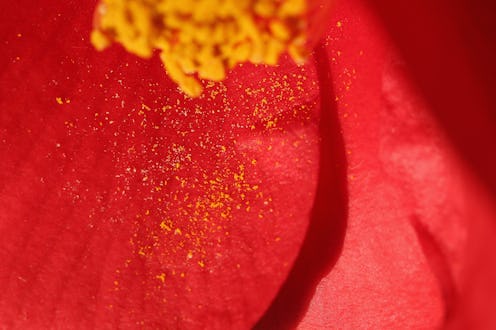Life
This Is How Climate Change Is Making Your Allergies Worse — Like, Way Worse

If you've noticed your spring allergies seem a little more...shall we say, enthusiastic, this year, you're not alone. According to recently released data from the American Academy of Allergy, Asthma and Immunology, the misery we're witnessing right now is an "allergy explosion" of not just longer-lasting allergy seasons in spring (and fall, unfortunately), but also an increase in the number of people suffering from allergies, NBC News reported. If the fact that this allergy season seems to be worse than ever doesn't surprise you, try this on for size: The academy believes it may actually be climate change affecting your allergies.
Dr. Stanley Fineman, former president of the American College of Allergy, Asthma and Immunology, told NBC, "Some research has suggested that the warming trend that we have in our environment is causing the pollen seasons to start a little bit earlier, and extend a little bit longer. Consequently, patients are suffering because they're exposed to pollen, for longer periods of time."
The academy's data suggests allergy seasons are lasting as much as 27 days longer, NBC reported, and a map from the academy showing the cities most affected by pollen indicates that folks in the northwest and southwest portions of the U.S. are being hit the hardest.
This data is not the first to suggest that climate change has an effect on allergies. Research from the U.S. government released in 2017 showed that "ragweed produces significantly more pollen as carbon dioxide increases," and that ragweed produces "nearly twice as much pollen now as it did 100 years ago and will likely double its production again over the coming century with predicted increases in carbon dioxide levels," ABC News reported.
Cynthia Rosenzweig, a senior scientist at Columbia University’s Center for Climate Systems Research, told ABC that the increase in ragweed pollen was "'a pretty good first sign' that climate change will be a problem for allergy sufferers."
Now, the American Academy of Allergy, Asthma and Immunology's data seems to be adding to the Agriculture Department's findings, and climate change does indeed seem to be a big problem for people allergic to pollen. According to NBC, the academy noted that "the 'big bad' pollen makers," aka oak, maple, and birch trees, are "producing the powdery substance at higher rates simultaneously with poplar, alder and ash [trees]."
With so many trees really putting their backs into pumping out as much pollen as possible, even people who normally don't suffer from hay fever can be affected, NBC added.
Dr. Clifford Bassett, medical director of Allergy & Asthma Care of New York, is the one who called what's happening an "allergy explosion." He told NBC, "Climate change, globalization, air pollution, and over-sanitization of the environment in the early years of life are just a few of the causes that, taken together, have introduced new allergens into our environment causing needless suffering."
For folks who know they're going to get allergies in a coming season, Bassett said to start taking over-the-counter or prescription allergy meds such as Zyrtec or Claritin one to two weeks before allergy season begins. He also told NBC that nasal steroids can help alleviate congestion (but watch your use of these, as overusing can cause rebound congestion, according to the Mayo Clinic).
Bassett added that other pollen-related allergy management strategies include wearing oversized or wraparound sunglasses to keep pollen out of your eyes, wearing hats (especially if you use hair products), avoiding air-drying clothes outside, and monitoring daily pollen counts so you know when it may be better to minimize your time outdoors, NBC reported. According to Bassett, "Higher levels of pollen are usually found on warm, dry and windy days and lower pollen counts on windless, wet and cloudy days."
Of course, if you're seriously struggling with allergies, you should check in with your healthcare provider to see if they can help you tackle your symptoms. Especially since, unfortunately, it looks like allergy season is far from over.